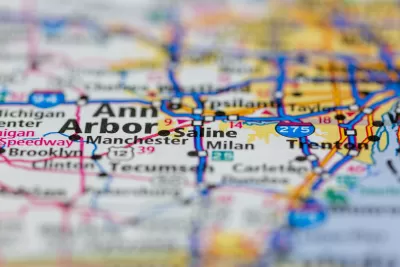Exploring alternative road funding options is a priority for Michigan legislators to make up the state’s road funding gap.

Michigan lawmakers are considering replacing the state’s 27.2 cents-per-mile gas tax with a mileage-based road usage fee, according to an article from Bridge Michigan. Democrats in the State House and Senate have added $5 million to proposed $6.8 billion transportation budget bills for a pilot program, reports Lauren Gibbons.
“Under the Senate proposal, the state would create a 19-member technical advisory committee that would help design a pilot program for the Michigan Department of Transportation to implement by June 2025,” Gibbons writes. The committee would assess the “ease and cost” of recording mileage and collecting taxes.
States like Oregon, Utah, Virginia have implemented similar mileage-based programs that allow motorists to opt in. Likewise, if the final budget includes funding for it, the Michigan program will be completely voluntary. Critics of these types of program object on a privacy basis, as they often use GPS data collection devices, though the proposed pilot would direct the state to connect a minimal amount of personal data.
“MDOT would lead the pilot for one year and report findings to the Legislature by the end of 2026, including cost, privacy issues, data collection technology, feasibility and participant acceptance,” reports Gibbons.
FULL STORY: A mileage tax for Michigan motorists? Lawmakers want $5M for pilot program

Maui's Vacation Rental Debate Turns Ugly
Verbal attacks, misinformation campaigns and fistfights plague a high-stakes debate to convert thousands of vacation rentals into long-term housing.

Planetizen Federal Action Tracker
A weekly monitor of how Trump’s orders and actions are impacting planners and planning in America.

In Urban Planning, AI Prompting Could be the New Design Thinking
Creativity has long been key to great urban design. What if we see AI as our new creative partner?

Cal Fire Chatbot Fails to Answer Basic Questions
An AI chatbot designed to provide information about wildfires can’t answer questions about evacuation orders, among other problems.

What Happens if Trump Kills Section 8?
The Trump admin aims to slash federal rental aid by nearly half and shift distribution to states. Experts warn this could spike homelessness and destabilize communities nationwide.

Sean Duffy Targets Rainbow Crosswalks in Road Safety Efforts
Despite evidence that colorful crosswalks actually improve intersection safety — and the lack of almost any crosswalks at all on the nation’s most dangerous arterial roads — U.S. Transportation Secretary Duffy is calling on states to remove them.
Urban Design for Planners 1: Software Tools
This six-course series explores essential urban design concepts using open source software and equips planners with the tools they need to participate fully in the urban design process.
Planning for Universal Design
Learn the tools for implementing Universal Design in planning regulations.
Appalachian Highlands Housing Partners
Gallatin County Department of Planning & Community Development
Heyer Gruel & Associates PA
Mpact (founded as Rail~Volution)
City of Camden Redevelopment Agency
City of Astoria
City of Portland
City of Laramie





























